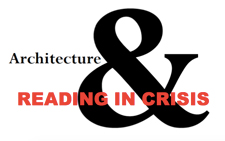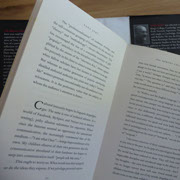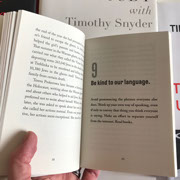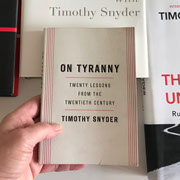Tony Judt and Timothy Snyder: Words and Deeds
by Jane McArthur, 26 May 2020.
The timing seems right to pair work by these two historians for a READING IN CRISIS interpolation. Grounded in their concerns with war, revolutions, totalitarianism and political crises of the twentieth century, both Judt and Snyder have each expressed their thoughts about the role of the State and the civilian in the twenty-first century in the two pieces selected. Both are as prescient now as when they were first made public.
Please listen to the short chapter 'Words', from The Memory Chalet by Tony Judt before watching the lecture given in 2017 by Timothy Snyder, following the publication of his manifesto On Tyranny: Twenty Lessons From The Twentieth Century. Each text speaks to the other in their insistence on the importance of paying attention to how language is employed, how information is disseminated and crucially how we then choose to act – or not.
There is a premise for bringing the two pieces I have selected together here as Judt and Snyder collaborated to produce Thinking the Twentieth Century which was completed not long before Judt’s death from the degenerative paralyzing disease ALS (amyotrophic lateral sclerosis) in 2010. As Judt was no longer able to write in the formal sense, the book is a transcribed record of conversations between the two men.
Tony Judt, 'Words' (2009)
Read by Jane McArthur,
Corsock, 26 May 2020.
Reading of Words.
Timothy Snyder, On Tyranny: Twenty Lessons From The 20th Century, Mar 14, 2017
At Politics and Prose Bookshop, Chevy Chase, Washington, D.C
https://www.youtube.com/watch?v=19IhRaWZUl4
Additional notes
Tony Judt, The Memory Chalet, London: William Heinemann, 2010, pp.147 – 154.
Words is the last essay of Part Two. Each chapter in this section addresses aspects of Judt’s youth: his Eastern European family roots, political awakening and time at University, whilst gently examining subjects ranging from pedagogy and the importance of silence to class and language.
Written at the time when illness was limiting his abilities, language was, albeit with difficulty, one of the few means of expression and thus contact with the world remaining to him. ‘The wealth of words in which I was raised’, Judt wrote in the concluding paragraph of Words ‘were a public space in their own right—and properly preserved public spaces are what we lack today. If words fall into disrepair, what will we substitute? They are all we have.’
Timothy Snyder, On Tyranny: Twenty Lessons From The 20th Century, 14th March, 2017, at Politics and Prose Bookshop, Chevy Chase, Washington, D.C
Unlike his other books which were written to cast light on the past, this small manifesto was written quickly in a matter of weeks after Trump won the 2016 election, as a means to address the present. Snyder emphasises the fine line between the manipulation of words and meaning in the America of 2016, in a digital world where everyone is a writer and a publisher, and where information is so quickly and easily disseminated.
See also: Neal Ascherson, Thinking the Twentieth Century by Tony Judt, 2 Feb 2012
https://www.theguardian.com/books/2012/feb/02/tony-judt-thinking-twentieth-century-review
© city|speculations 2012



